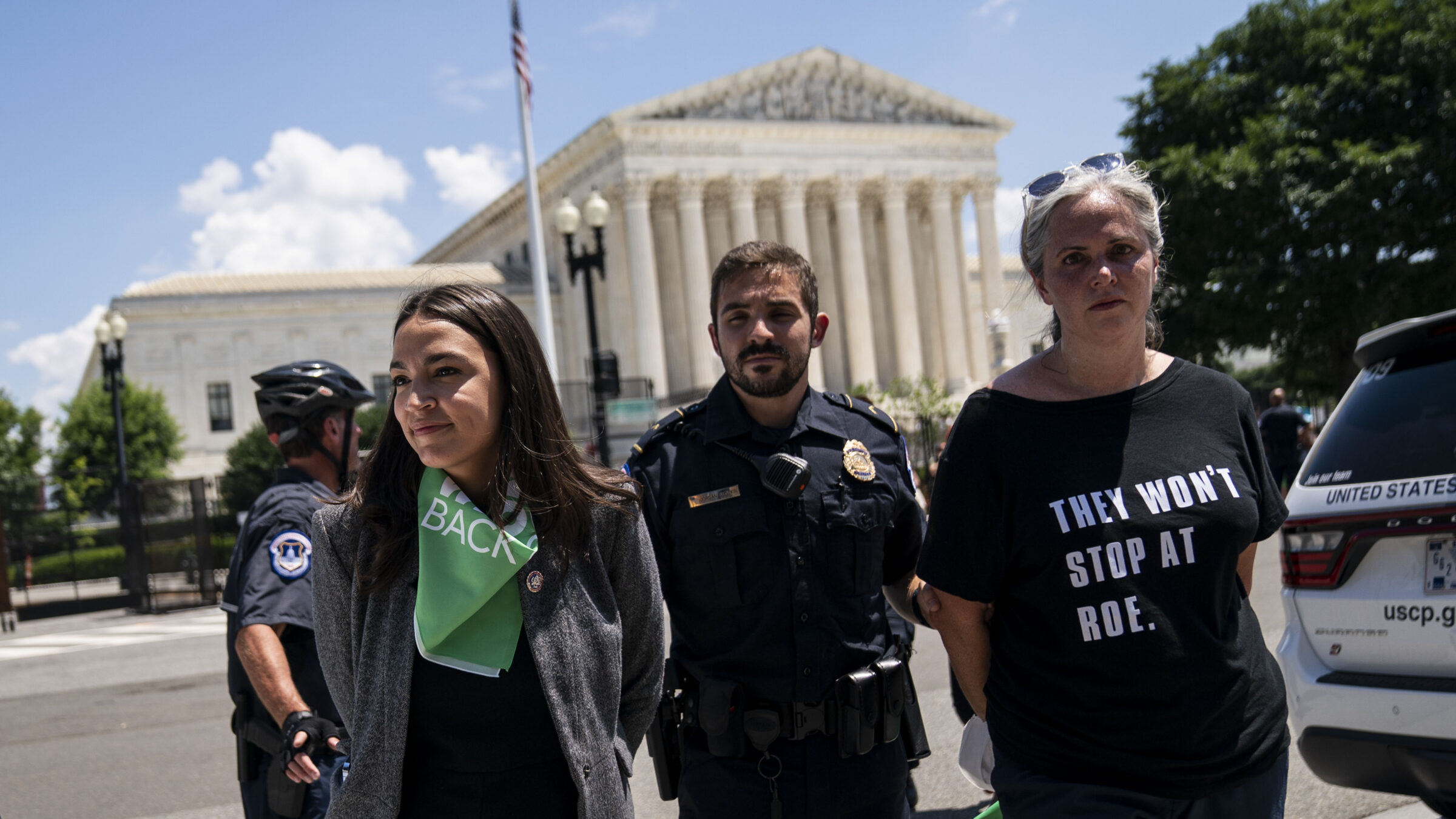Earlier this week, in the wake of the Supreme Court’s decision to bless Donald Trump with absolute immunity for his recent attempts to overthrow the government, Congresswoman Alexandria Ocasio-Cortez introduced formal articles of impeachment against two members of the majority: Justices Samuel Alito and Clarence Thomas. Their intertwined patterns of professional misconduct and conflicts of interest, Ocasio-Cortez said, pose a “grave threat” to the rule of law, and are “one of the clearest cases for which the tool of impeachment was designed.” In Democratic politician-adjusted terms, hers is a startlingly unusual position: that people who have power can use it to hold corrupt officials accountable.
“It is incumbent upon Congress to contain the threat this poses to our democracy,” Ocasio-Cortez said. “Congress has a legal, moral, and democratic obligation to impeach.”
.@RepAOC @AOC: “I rise today to introduce Articles of Impeachment against Associate Justices of the Supreme Court, Clarence Thomas and Samuel Anthony Alito, Jr.” pic.twitter.com/P064jdwLgI
— CSPAN (@cspan) July 11, 2024
This is, to put it generously, a long shot at the moment. Only one Supreme Court justice, Samuel Chase, has ever been impeached, and that was more than 200 years ago. (The Senate ultimately acquitted him.) In 2024, a Republican-controlled House is not going to impeach a Republican Supreme Court justice, and even if it did, a closely-divided Senate is not going to get anywhere near the two-thirds majority necessary to remove either man from office. Three years ago, only seven Republican senators could be bothered to vote to convict Trump for sending a mob to their workplace to kill them. I would not expect more enthusiasm for a move that would allow the seats occupied by the two most conservative justices to be filled by President Joe Biden.
As far as messaging goes, though, “actually checking and balancing a co-equal third branch of government” is a pretty good one. For too long, Democratic politicians have approached the Supreme Court with a deep-seated sense of learned helplessness, reacting to each revelation of flagrant corruption and/or partisan hackery with, at most, somber press releases expressing the sentiment that someone (not them) really ought to do something about it. Rather than honor this tradition of feckless handwringing, Ocasio-Cortez is making use of the constitutionally-prescribed methods available to her for imposing consequences on elected officials who abuse their power. This is how Democrats should be thinking and talking about the Republican justices going forward: as partisan opponents whom they can work to defeat.
The thrust of both documents will be familiar to any casual consumer of the news of late. The articles of impeachment for Alito, for example, note his displays of insurrection-curious flags outside his homes, both in the days after January 6 and in the years since, and characterize his failure to recuse from January 6-related cases as “incompatible with the trust and confidence placed in him as a justice.” The Thomas articles are longer, mostly because there is so much material to cover: the millions of dollars’ worth of unreported gifts received, the hundreds of thousands of dollars paid to his wife by right-wing organizations with business before the Court, and his extremely dubious assertions that he was blissfully unaware of his wife’s involvement in challenges to the 2020 election results while he was deciding cases related to it.
Again, anyone hoping for a fast-tracked Senate trial that ends with Thomas and Alito barred from holding public office is going to be disappointed. Ocasio-Cortez herself acknowledged as much on the House floor on Thursday, diplomatically noting that the move faces challenging “odds in a Republican-led chamber.”
But contrast her language with that of, say, Dick Durbin, the Democratic chair of the Senate Judiciary Committee, whose primary response to the last two years of reporting on Thomas’s cartoon-villain corruption has been firing off tweets begging Chief Justice John Roberts to adopt an ethics code. In May, when the Alito flag stories emboldened Durbin enough to request a meeting with Roberts, Roberts blew him off, because at this point, he’s clocked Durbin as a politician who is less interested in rooting out corruption than he is in appearing to care about it.
Earlier this week, with four months to go until the election, Durbin announced that the Senate Judiciary Committee would convene a hearing to examine the “immediate legal and policy ramifications” of the Trump immunity decision. Lest you get the impression that he might be treating this issue with the urgency it deserves, Durbin also announced the hearing will take place in September.

Ocasio-Cortez is arrested outside the Supreme Court building during a protest of the decision to overturn Roe v. Wade, July 2022 (Kent Nishimura / Los Angeles Times via Getty Images)
Frustrating though this kid-gloves treatment may be, it is grimly consistent with the prevailing sense among establishment Democrats that the Schoolhouse Rock myth of the independent judiciary makes it gauche to attack the Court. Even after the Trump immunity decision came down, the only call to action Biden could muster was asking “the American people” to “do what the Court should have been willing to do” by voting down Trump at the ballot box. This is roughly analogous to the fire chief gazing at a building engulfed in flames, glancing at a ladder truck parked next to the fire hydrant, and then turning to the anxious townspeople and urging them to start filling buckets.
This ignominious history of Democrats trying to do judicial politics is why I do not especially care that introducing articles of impeachment against Thomas and Alito is, for the moment, mostly symbolic. To the extent that Ocasio-Cortez is being “bold” or “ambitious” here, it is only in comparison to her colleagues who have simply decided not to do this aspect of their jobs. In the context of an ascendant fascist movement in this country, I will take clear-eyed repudiations of its intellectual leaders over muted acceptance of their tyrannical decisions every single time.
Ocasio-Cortez’s approach is also an encouraging sign of a generational shift, as elected officials who cling to fond memories of the Warren Court give way to politicians who have spent their adult lives watching the Court function as the engine of reactionary politics. This is as true in Washington as anywhere else: Polling conducted last year found that just 30 percent of people between ages 18 and 29 approve of the Court’s performance, and 41 percent of those between 30 and 49. The numbers jump to 50 percent for people between 50 and 64, and a whopping 54 percent for those 65 and older. As bad as the justices’ approval rating is right now, these numbers suggest that things could get a lot worse for them in the years to come.
Even if neither party wins a two-thirds Senate majority in our lifetimes, for Democrats, impeachment hearings and Senate trials would still be worthwhile uses of time and energy. You do not need to force Thomas and Alito into early retirements to shine a spotlight on their corruption and malfeasance—and on the broken institution that has allowed their corruption and malfeasance to go unchecked. Also, impeaching corrupt Supreme Court justices is the sort of thing that sounds fanciful until suddenly it is not. Republicans currently hold a seven-seat majority in the House, which means Democrats are a few flipped seats away from having the numbers to follow through.
A presidential election is happening five months from now, and as you read this sentence, Donald Trump is (at worst) a coin flip to win it. He is poised to do all kinds of deranged, frightening shit during a second term in office, and the six-justice conservative supermajority he built has spent four years signaling that its members have no intention of checking his worst instincts. This is not the time for Democratic politicians to indulge the fantasy of a Supreme Court that is coming to save democracy. This is the time to confront the reality of a Supreme Court that is actively trying to kill it.






